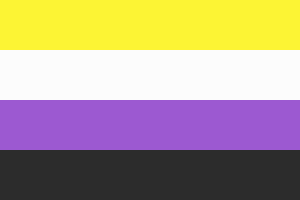The 14th July annually is International Non Binary People’s Day and is aimed at raising awareness of the issues that Non-Binary people face around the world.
The day was first celebrated in 2012 on a date between International Men's Day and International Women's Day.
Many Genders One Voice and Queensland Council for LGBTI Health (QC) wanted to shine a spotlight on our Non-Binary community members and unpack how we might be able to continue to celebrate them beyond today. Thanks to the wonderful folks at LaTrobe University who brought us Private Lives 3, we can start to take a closer look at Non-Binary people’s experiences.
The day was first celebrated in 2012 on a date between International Men's Day and International Women's Day.
Many Genders One Voice and Queensland Council for LGBTI Health (QC) wanted to shine a spotlight on our Non-Binary community members and unpack how we might be able to continue to celebrate them beyond today. Thanks to the wonderful folks at LaTrobe University who brought us Private Lives 3, we can start to take a closer look at Non-Binary people’s experiences.
Non-Binary 101
|
Want to be a better ally to Non-Binary People?
Below are some basic actions you can do to affirm and support Non-Binary folk. - Undertake Self directed awareness and education - Don’t make assumptions - Using gender neutral language wherever possible - Pronoun confirming, cueing & correcting. - Don’t ask about sex assigned at birth unless necessary for service delivery. - Take steps to ensure non binary inclusive service provision in healthcare settings. - These are all actions that can affirm and support Non-Binary people and communities. |
Private Lives 3 Data
All stats taken from: Hill, A. O., Bourne, A., McNair, R., Carman, M. & Lyons, A. (2020). Private Lives 3: The health and Wellbeing of LGBTIQ people in Australia. ARCSHS Monograph Series No. 122. Melbourne, Australia: Australian Research Centre in Sex, Health and Society, La Trobe University
In total, 6,835 people took part in the Private Lives 3 (PL3) survey, 13.6% participants identified as non-binary.
General Health Data:
PL3 participants reported lower self-rated health than the general Australian population. Less than one third of participants rated their health as very good or excellent compared to more than half (56.4%) of the general Australian population aged over 15 years.
Just over 20% Non-Binary participants reported very good/excellent health.
63.3% of Non-Binary people stated they had ever experienced gender euphoria and 14.9% stated they were currently experiencing it.
65.9% of non-binary participants reported currently living their lives in a gender that is different from the one assigned at birth, compared to 91% for trans men and 81% for trans women.
Gender euphoria has been defined in a variety of ways but broadly refers to an experience of feeling totally affirmed in one’s gender where there is a sense of positive gender fulfillment
In total, 6,835 people took part in the Private Lives 3 (PL3) survey, 13.6% participants identified as non-binary.
General Health Data:
PL3 participants reported lower self-rated health than the general Australian population. Less than one third of participants rated their health as very good or excellent compared to more than half (56.4%) of the general Australian population aged over 15 years.
Just over 20% Non-Binary participants reported very good/excellent health.
63.3% of Non-Binary people stated they had ever experienced gender euphoria and 14.9% stated they were currently experiencing it.
65.9% of non-binary participants reported currently living their lives in a gender that is different from the one assigned at birth, compared to 91% for trans men and 81% for trans women.
Gender euphoria has been defined in a variety of ways but broadly refers to an experience of feeling totally affirmed in one’s gender where there is a sense of positive gender fulfillment

Actions for allyship:
- Take steps to ensure non binary inclusive service provision in healthcare settings.
- Communicate this work with communities and consult with community and seek feedback to assess how you are progressing.
- Use pronouns and gender affirming language. If not sure, ask respectfully and privately.
- Don’t make assumptions about people’s gender.
- Create safer spaces for people to affirm their identity and respect people’s readiness and sense of safety with regards to disclosing.
QC can help organisations and services through this journey of embedding inclusion. https://www.qc.org.au/rainbow-pride-work-training
- Take steps to ensure non binary inclusive service provision in healthcare settings.
- Communicate this work with communities and consult with community and seek feedback to assess how you are progressing.
- Use pronouns and gender affirming language. If not sure, ask respectfully and privately.
- Don’t make assumptions about people’s gender.
- Create safer spaces for people to affirm their identity and respect people’s readiness and sense of safety with regards to disclosing.
QC can help organisations and services through this journey of embedding inclusion. https://www.qc.org.au/rainbow-pride-work-training
Relationships:
54.5% of Non-Binary participants reported being in committed relationship/s.
63.5% of Non-Binary people strongly agreed that ‘My sexual and romantic partners have affirmed my gender in ways that support me’.
54.5% of Non-Binary participants reported being in committed relationship/s.
63.5% of Non-Binary people strongly agreed that ‘My sexual and romantic partners have affirmed my gender in ways that support me’.
|
Actions for allyship: - Affirm health relationship dynamics. - Compassionately challenge internalised phobias or acceptance of power and control imbalances in relationships. - Understand impact of previous trauma and discrimination upon people’s current lives and their ability to access safe services. Queer Without Fear resources:
| |||||||||||||
Legal:
17.2% Non-Binary participants reported gaining legal recognition for their gender identity in their passport & 10% on their birth certificate.
17.2% Non-Binary participants reported gaining legal recognition for their gender identity in their passport & 10% on their birth certificate.
Community:
A greater proportion (64.5%) of Non-Binary participants agreed or strongly agreed that they feel a part of the Australian LGBTIQ community compared to cisgender people and binary trans people.
69.9% of Non-Binary participants agreed or strongly agreed that participating in Australia’s LGBTIQ community is a positive thing for them, this was higher than for cisgender people and binary trans people.
Also, almost three quarters of Non-Binary participants (74.8%; n = 684) reported having participated in LGBTIQ social events at some time which is more than cisgender people and binary trans people reported.
29.7% of Non-Binary people agreed or strongly agreed that ‘My local community has affirmed my gender in ways that support me’ .
A greater proportion (64.5%) of Non-Binary participants agreed or strongly agreed that they feel a part of the Australian LGBTIQ community compared to cisgender people and binary trans people.
69.9% of Non-Binary participants agreed or strongly agreed that participating in Australia’s LGBTIQ community is a positive thing for them, this was higher than for cisgender people and binary trans people.
Also, almost three quarters of Non-Binary participants (74.8%; n = 684) reported having participated in LGBTIQ social events at some time which is more than cisgender people and binary trans people reported.
29.7% of Non-Binary people agreed or strongly agreed that ‘My local community has affirmed my gender in ways that support me’ .
|
Actions for Allyship:
- LGBTIQ+, Sistergirl and Brotherboy spaces are important to Non-Binary people despite not always feeling included. - Consider how you can contribute to creating safer spaces for people to affirm Non-Binary gender identities. - Not sure? Ask Non-Binary people what that might look like. |
Gender Affirmation:
- 25.8% of Non-Binary participants agreed or strongly agreed with the statement, ‘I have been easily able to access gender affirming care when I have needed to (half of binary trans people.)
- 71.5% strongly agreed ‘Having my gender identity affirmed by others (i.e., socially) has been a high priority for me’
- 31.6% agreed or strongly agreed that ‘Gender affirming surgery has been a high priority for me’
- 70.3% reported having ever altered the appearance of their body to affirm their gender identity, 58.5% reported being satisfied or very satisfied with these changes.
- 22.2% currently taking hormonal medications.
- 23.6% had never taken hormonal medications but planned to in the future.
- 49.3% had never taken hormonal medicines and did not plan to in the future.
- 25.8% of Non-Binary participants agreed or strongly agreed with the statement, ‘I have been easily able to access gender affirming care when I have needed to (half of binary trans people.)
- 71.5% strongly agreed ‘Having my gender identity affirmed by others (i.e., socially) has been a high priority for me’
- 31.6% agreed or strongly agreed that ‘Gender affirming surgery has been a high priority for me’
- 70.3% reported having ever altered the appearance of their body to affirm their gender identity, 58.5% reported being satisfied or very satisfied with these changes.
- 22.2% currently taking hormonal medications.
- 23.6% had never taken hormonal medications but planned to in the future.
- 49.3% had never taken hormonal medicines and did not plan to in the future.
|
Actions for Allyship:
- Non-Binary identities are still being learned about by professionals that support Trans and Gender-Diverse folk. - Be a safe person for people to talk to while they attempt to navigate medical systems. Advocate for professional development and ongoing learning in these environments. - Don’t underestimate the positive impact of making an effort to use correct pronouns, names, and language. Correct yourself if you need to and move on. - Don’t assume surgery is a part of every gender diverse person’s experience. - Don’t assume that surgery will alleviate all of the the mental and emotional impact of dysphoria. - Don’t ask about surgeries if not needed for service delivery. - Don’t assume what, if any hormones people are taking or want to take. - If you’re a medical professional, learn about micro-dosing for non binary people and ensure you are using an informed consent model when working with these communities. - Be mindful of your own understandings on gender identities and commit to ongoing learning. |






